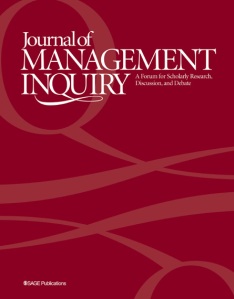A Passion for Work: Part 1 of 5
Every manager wants to increase employee engagement. But there’s a difference between being engaged and being truly passionate about your job–and the employee with a passion for the work is the one who will make a difference in the organization.
Work passion has been defined by the Ken Blanchard leadership training companies as “the positive emotional state of mind resulting from perceptions of worthwhile work, autonomy, collaboration, growth, fairness, recognition, connectedness to colleagues, and connectedness to leader.” This week, we’ll highlight research exploring the ways that management scholars and practitioners can increase their passion for the job and, in the process, their own life satisfaction and the quality of their contributions to the field.
 For our first installment, we turn the page to a Journal of Management Inquiry article published by Shelley Brickson of the University of Illinois, Chicago, in the June 2011 issue, “Confessions of a Job Crafter: How We Can Increase the Passion Within and the Impact of Our Profession“:
For our first installment, we turn the page to a Journal of Management Inquiry article published by Shelley Brickson of the University of Illinois, Chicago, in the June 2011 issue, “Confessions of a Job Crafter: How We Can Increase the Passion Within and the Impact of Our Profession“:
Job crafting, engaging in practices that alter our jobs for the better, has enormous potential to enliven scholars and to enhance our field’s societal impact. Drawing upon a personal tale, I outline various job crafting techniques in which I have engaged and note how these practices have transformed the level of satisfaction I feel for my job, profession, and life, while also enriching the quality of my research and teaching contributions. As profoundly positive as has been my experience with job crafting, I have also encountered some significant systemic obstacles. For the tenured, such obstacles would likely be frustrating, constraining passion and undermining contributions. For the untenured, many become pitfalls that can endanger careers. I address some of the obstacles that I encountered while engaging in job crafting practices, framing them in terms of what we can do to remove them. I am optimistic that, collectively, we can dramatically diminish and even abolish the obstacles outlined here for the benefit of scholars, the field, and society.
Read the complete article in the Journal of Management Inquiry, and click here to be notified about new research from the journal, which explores ideas and builds knowledge in management theory and practice, with a focus on creative, nontraditional research, as well as key controversies in the field.

































































































